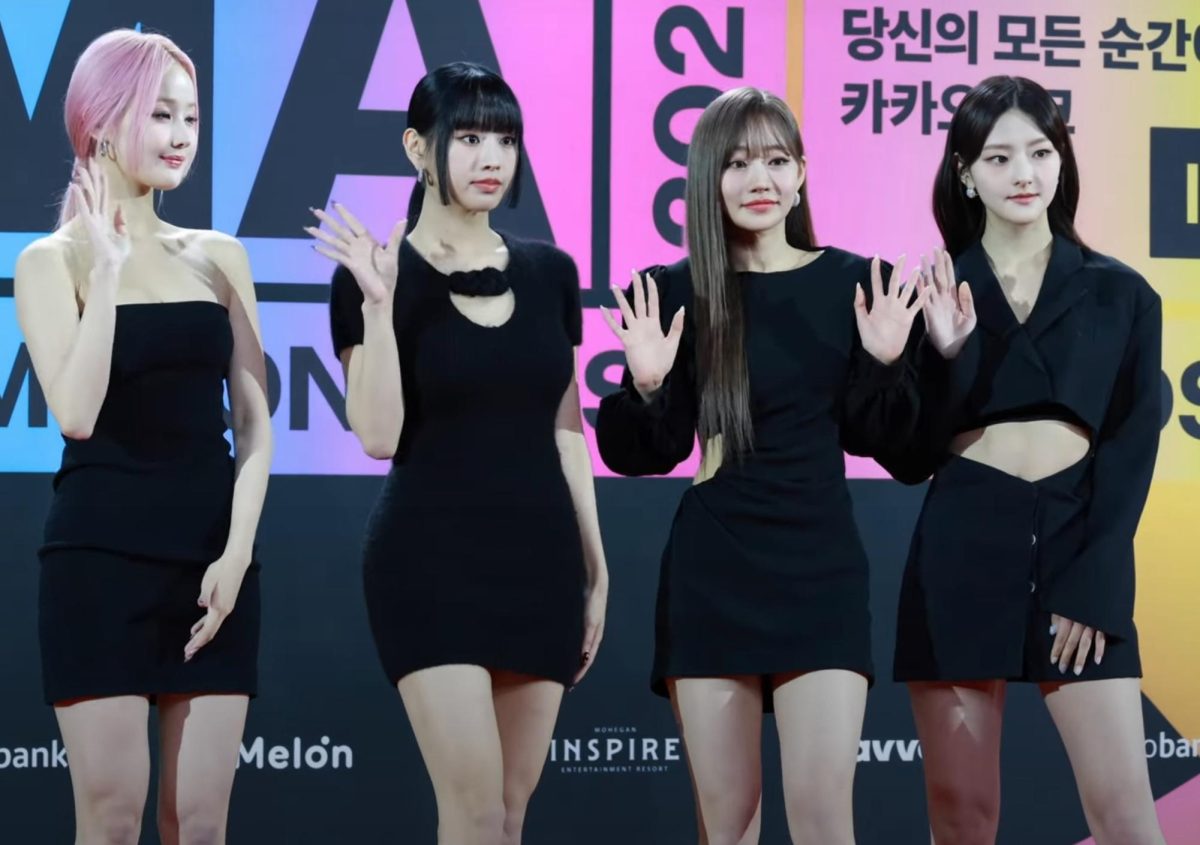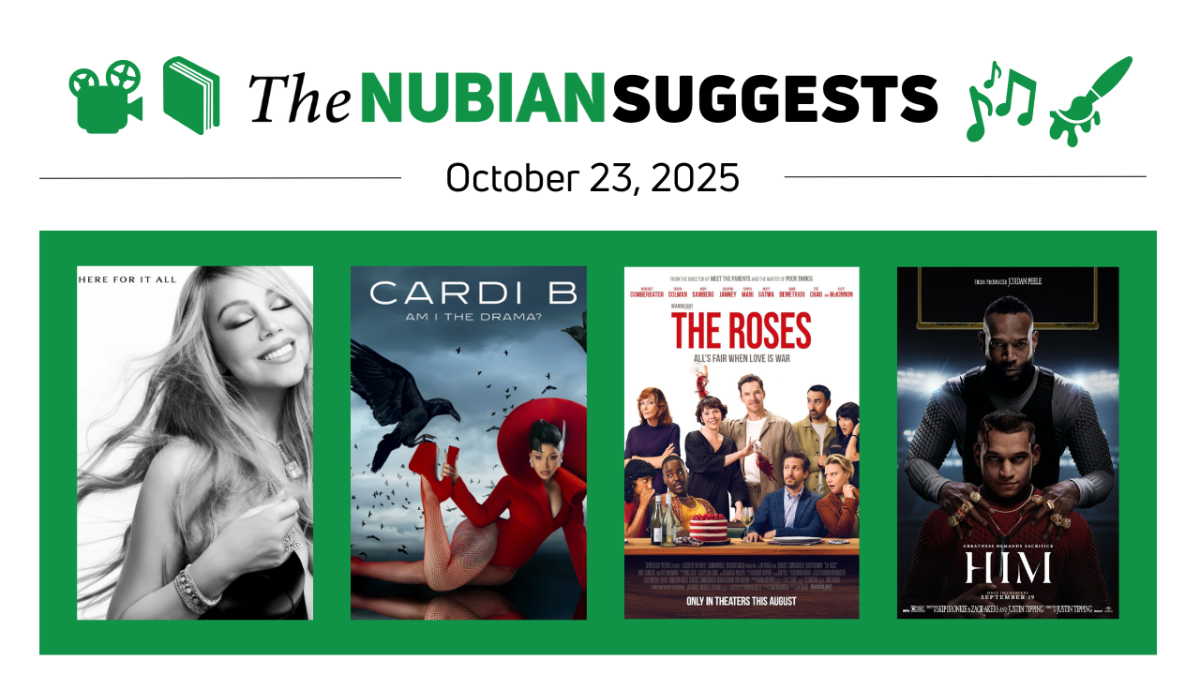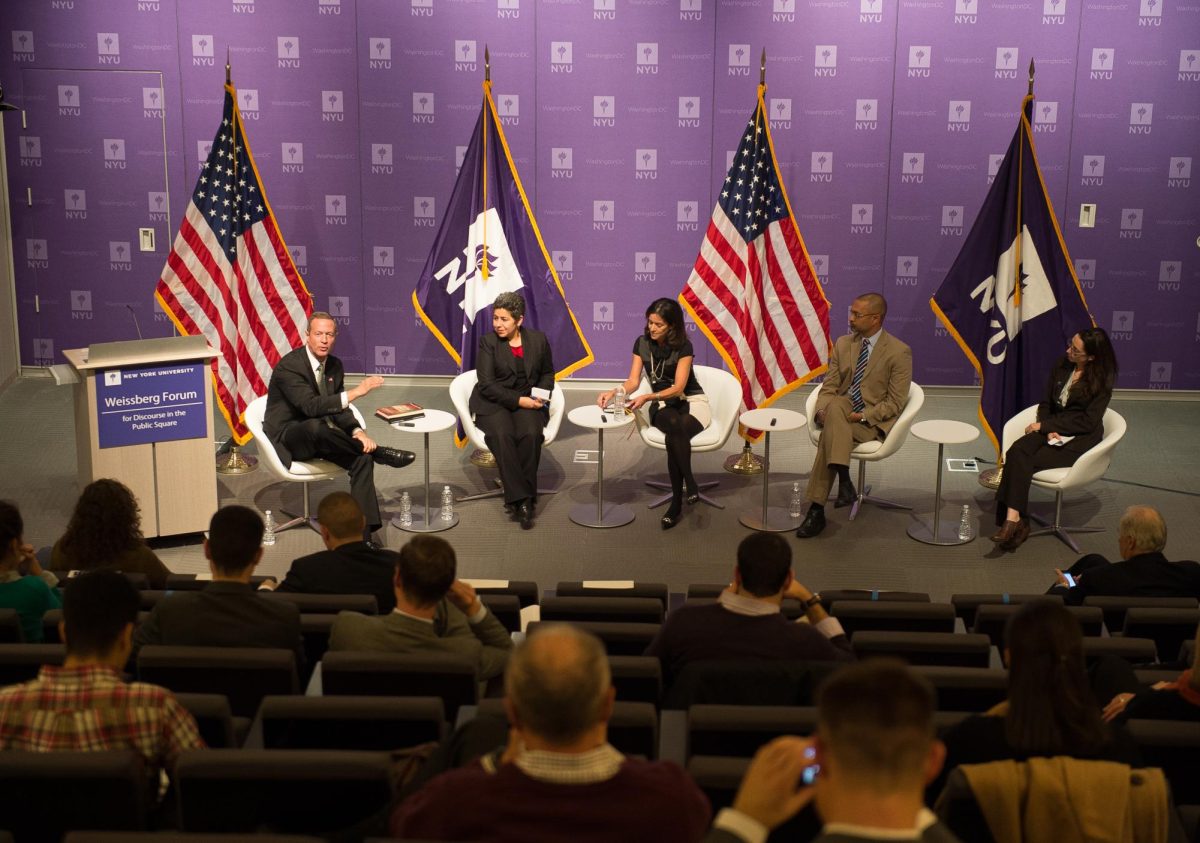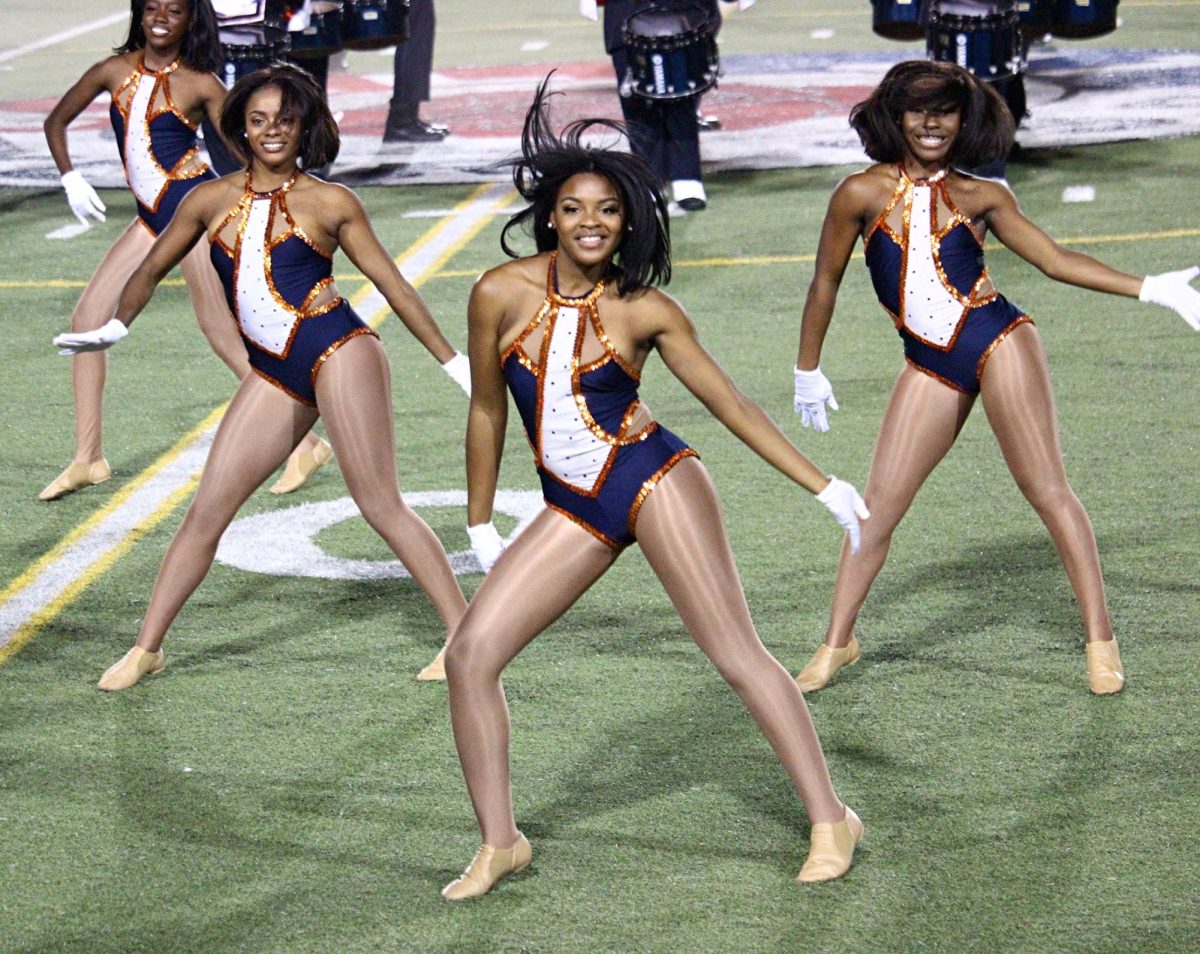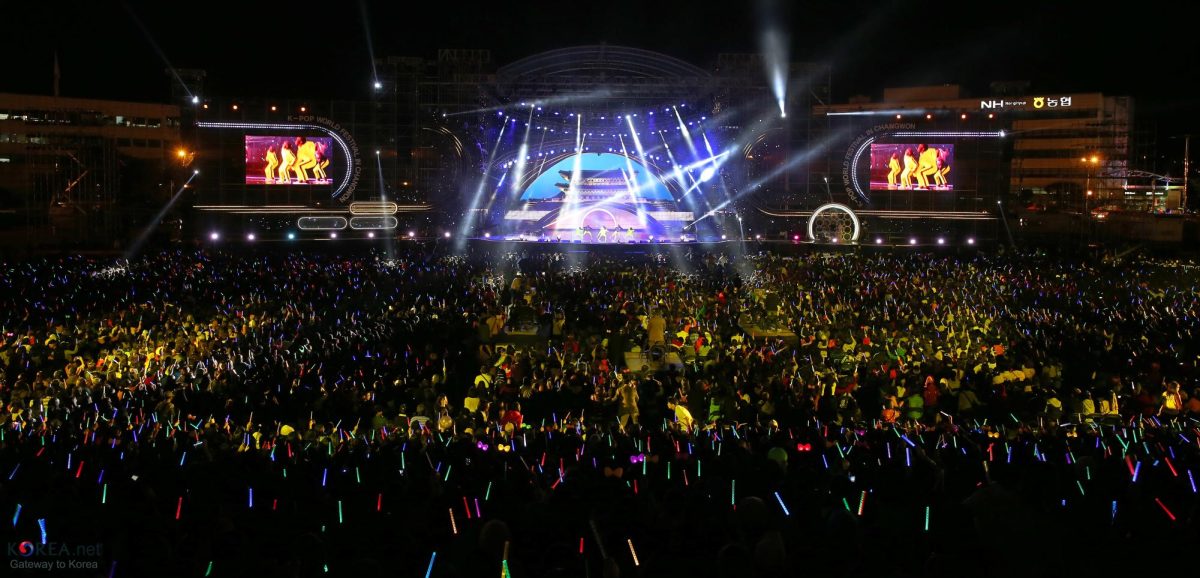I started listening to K-pop because I thought many of the groups had interesting concepts and the music was good, and I assume other fans did for similar reasons. What I didn’t expect was to be met with blatant racism and ignorance from idols and their fans.
Kiss of Life, or KIOF for short, held a YouTube livestream on April 2, in honor of leader Julie’s 25th birthday. The birthday theme was “old-school hip-hop vibes.” After receiving backlash from fans, the live was later deleted.
The members Belle, Natty, Julie and Haneul were seen wearing stereotypical hip-hop clothing, including gold chains and snapbacks. Haneul was even rocking cornrows, a protective Black hairstyle. Member Natty showed a picture of three Black men as her inspiration.
Throughout the livestream, the members used African American Vernacular English (AAVE) and spoke in an imitative “blaccent,” along with Black soul food, such as collard greens and cornbread, being served as their meal for the day.
The members gave each other different names, like Taco Belle, who was given the name because her outfit resembled a Latina woman. Natty was named NT and Haneul was named Bob Sky.
Following the live, the members posted a, now deleted, TikTok of them lip-syncing to 50 Cent’s “In da Club” with the same background and outfits.
What was even more shocking was that two of the four members are from the United States. Julie was born and raised in Hawaii until the age of 13, and Belle was born in Washington and lived there for around eight to nine years.
When KIOF debuted in 2023, I remember everyone being excited because they were bringing back that iconic older K-pop sound.
And, well, they brought older K-pop back. Sound, style and the industry’s racist values – all of it.
KIOF’s blatant ignorance and racism towards Black people and other marginalized groups isn’t the latest instance of this, and will not be the last.
Many groups that debuted in the early 2000s through the early 2010s have been caught up in some sort of racist controversy.
Over the last ten years, we have witnessed a quick rise in the popularity of K-pop. After BTS’s 2017 rise to success in the United States, many groups followed, trying to mimic their success.
One would expect that with the sudden push from Korean entertainment companies, these industries would educate themselves on political correctness and on the different cultures they interact with. But this has not been the case at all. Every time I open my TikTok “For You” page, I’m met with creators of color discussing a new idol who was exposed for their ignorant or racist remarks.
The K-pop industry itself is controversial. However, what is considered a real “controversy” or “scandal” differs among Korean and foreign netizens in comparison to Western social media. Korean netizens, or knetz for short, often create scandals from dating rumors, like Hyuna and E’Dawn getting kicked out of their label for dating, or drug-use allegations, like iKon’s B.I. leaving the group after being accused of trying to purchase drugs.
On the other hand, global netizens worry about which K-pop idol will be the next one to appropriate their culture, or face abuse allegations or charges.
I have kept up with K-pop since early 2019 and noticed this trend. I have witnessed a multitude of scandals dealing with racism, abuse and more. This includes the Burning Sun Scandal, which included BIGBANG’s Seungri along with several other idols being exposed for their disgusting acts towards multiple women. This sexual abuse scandal, paired with KIOF’s racist actions towards Black people, paints the image of ignorance, with minorities being the canvas and the K-pop industry holding the paintbrush.
Honestly, if I started listing out every second or third generation idol caught or recorded saying the N-word, I would be here forever.
Before KIOF’s live stream, K-pop fans on Twitter and TikTok were in shambles because of the infamous “YG Leaker” on Discord leaking several pre-debut videos of BLACKPINK, including their practice videos, where three out of the four members were caught saying the N-word in several covers.
When I saw those videos, I wasn’t shocked as I knew about the existence of these covers. Neither the members nor their label, YG Entertainment, have issued a statement or addressed this. Since this scandal, BLACKPINK members Lisa and Jennie performed at Coachella this year, and there has been no acknowledgement of this scandal. I’m not surprised that there hasn’t been any acknowledgement, nor do I expect there to be any. This just adds to the number of racism scandals that have gone unacknowledged.
Colorism throughout the industry has been an issue for years. The casualness of these comments is evident on different platforms. For example, Omega X’s Sebin making comments on the group’s 1:1 messaging platform, and NCT’s Jisung making comments about a member’s skin color in a vlog.
Due to East Asian beauty standards that equate beauty to pale skin, these comments are no surprise. What I am surprised about is how comfortable the idols were in making these comments in public. These instances all occurred on livestreams or variety shows.
Although they don’t like their darker skin, these K-pop idols like to appropriate the cultures of people with skin darker than theirs.
As I mentioned, Hanuel from KIOF had cornrows during the infamous livestream, but she’s not the only one. HyunA, EXO’s Kai, several members of NCT and many others have all had dreads or cornrows at least once during a performance or music videos.
Other groups like 2NE1 and (G)I-DLE have been accused of using several aspects of South Asian cultures without proper research or respect. For example, wearing bindis or using certain dance moves to mock South Asian traditional dances.
Blackface has also been an issue in the industry. Most notably, MAMAMOO’s use of blackface in 2017. During a concert, they played a parody of Bruno Mars’ “Uptown Funk.” All four members painted their skin to imitate Mars and his backup dancers. The group did issue an apology for this.
I have a lot of problems with the fact that these ignorant and racist remarks often go unaddressed by idols and their labels. However, if it were a dating rumor, the companies would confirm or deny it promptly.
Like when aespa’s Karina and actor Lee Jaewook were rumored to be dating, their representatives confirmed they had been seeing each other. A few weeks later, they confirmed that the couple broke up. Karina issued an apology letter after facing backlash from fans for dating.
I have a problem with how hypocritical some of these artists and labels are. Their ignorant and racist actions and remarks often go ignored by them, but God forbid a dating rumor starts circulating, they would address it immediately.
But when these actions or accusations are addressed, I don’t applaud them because it’s the bare minimum, and these actions shouldn’t have happened in the first place.
Since getting into K-pop and interacting with other fans online, I have seen how fans handle and treat these instances. The lengths some people go to defend their favorite racist is insane.
I want to see fewer apologies and more work to prevent these actions from happening throughout the industry. If these labels want K-pop to succeed in the West, how will they accomplish that if they offend more than half of their audience here when they’re at home?
I understand and support the people who choose not to continue supporting these idols or groups, whether it’s no longer streaming their music, purchasing their albums, or both. As casual listeners or huge supporters, I think it’s important to hold our favorite artists accountable for their actions and to hold them to a higher standard.
These idols understand racism, cultural differences and are aware of what they’re doing. There’s no need to defend them for the racist remarks they made in 2025. K-pop is not that serious, not to the point where we must put it before our morals and beliefs.

